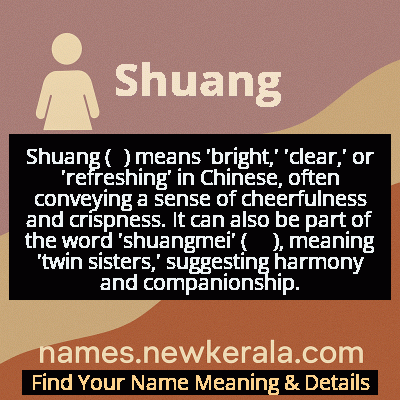Shuang Name Meaning & Details
Origin, Popularity, Numerology Analysis & Name Meaning of Shuang
Discover the origin, meaning, and cultural significance of the name SHUANG. Delve into its historical roots and explore the lasting impact it has had on communities and traditions.
Name
Shuang
Gender
Female
Origin
Chinese
Lucky Number
7
Meaning of the Name - Shuang
Shuang (爽) means 'bright,' 'clear,' or 'refreshing' in Chinese, often conveying a sense of cheerfulness and crispness. It can also be part of the word 'shuangmei' (双妹), meaning 'twin sisters,' suggesting harmony and companionship.
Shuang - Complete Numerology Analysis
Your Numerology Number
Based on Pythagorean Numerology System
Ruling Planet
Neptune (Ketu)
Positive Nature
Intuitive, analytical, spiritual, and inquisitive.
Negative Traits
Secretive, reserved, aloof, and can be overly critical.
Lucky Colours
Green, yellow.
Lucky Days
Monday.
Lucky Stones
Cat’s eye, moonstone.
Harmony Numbers
1, 5, 6.
Best Suited Professions
Scientists, researchers, spiritual leaders, detectives.
What People Like About You
Depth of knowledge, analytical skills, spirituality.
Famous People Named Shuang
Shuang Xu
Actress
Award-winning performances in historical dramas and contemporary television series
Wang Shuang
Professional Footballer
Asian Football Confederation Women's Player of the Year and national team star
Li Shuang
Scientist
Pioneering research in environmental science and climate change mitigation
Zhang Shuang
Business Executive
Leadership in technology innovation and corporate development
Name Variations & International Equivalents
Click on blue names to explore their detailed meanings. Gray names with will be available soon.
Cultural & Historical Significance
Extended Personality Analysis
People named Shuang typically exhibit a distinctive personality profile characterized by intellectual brightness and emotional transparency. Their mental clarity enables them to analyze complex situations with remarkable precision, often seeing solutions that others miss. This cognitive sharpness is complemented by exceptional communication skills - Shuang individuals express themselves with directness and honesty that can be refreshing, though occasionally challenging for those accustomed to more diplomatic approaches. Emotionally, they possess what psychologists might call high emotional intelligence combined with low emotional manipulation; they understand feelings deeply but don't use that understanding strategically. In social settings, Shuang personalities are often the 'clear voice' in groups, cutting through confusion and helping others see situations objectively. Their openhearted nature makes them loyal friends and reliable partners, though they may struggle in environments requiring political subtlety or hidden agendas. Career-wise, they excel in fields demanding analytical thinking and honest communication, such as science, law, counseling, or leadership positions where transparency is valued. While their straightforwardness can sometimes be misinterpreted, most people eventually appreciate the rare quality of dealing with someone who says what they mean and means what they say.
Modern Usage & Popularity
In contemporary naming practices, Shuang maintains its traditional appeal while adapting to modern sensibilities. Current usage trends show the name is particularly popular among urban, educated Chinese families who value both cultural heritage and progressive values. While it ranked much higher in popularity during the 1980s and 1990s, it has stabilized as a classic choice rather than a trendy one. Modern parents choosing Shuang often cite its positive associations with intelligence, honesty, and emotional health - qualities increasingly valued in today's complex social environment. The name has also seen some creative adaptations, with combinations like 'Yushuang' (Jade Clarity) or 'Xinshuang' (Heart Clarity) gaining popularity. Interestingly, the name crosses generational appeal, being chosen by both older grandparents appreciating traditional values and younger parents seeking meaningful names without being overly common. In overseas Chinese communities, Shuang serves as a cultural anchor, preserving linguistic and philosophical traditions while fitting well into multicultural environments. Its steady, rather than flashy, popularity suggests it will remain a meaningful choice for families seeking names with depth and positive characteristics.
Symbolic & Spiritual Meanings
The symbolic resonance of Shuang extends across multiple dimensions of Chinese culture and philosophy. In nature symbolism, Shuang represents the crisp clarity of autumn mornings when the air is fresh and visibility extends to distant mountains - a metaphor for expanded understanding and perspective. In elemental symbolism, it connects with water in its purest form: mountain springs, morning dew, and distilled liquids that reflect truth without distortion. The character's visual composition symbolizes the expansion of consciousness, with the 'big' radical suggesting breadth of understanding and the four dots representing illumination in all directions. In traditional Chinese aesthetics, Shuang embodies the quality of 'touming' (transparency) valued in fine porcelain, clear gemstones, and elegant calligraphy where every stroke reveals the artist's intention without obscurity. Philosophically, it represents the Daoist ideal of 'wu wei' - natural action without forced effort - and the Buddhist concept of clear mind undisturbed by attachments. In interpersonal relationships, Shuang symbolizes the rare quality of communication where words match intentions and actions align with values. This multi-layered symbolism makes the name particularly meaningful for families seeking to instill values of integrity, clarity, and authentic self-expression in their children.

